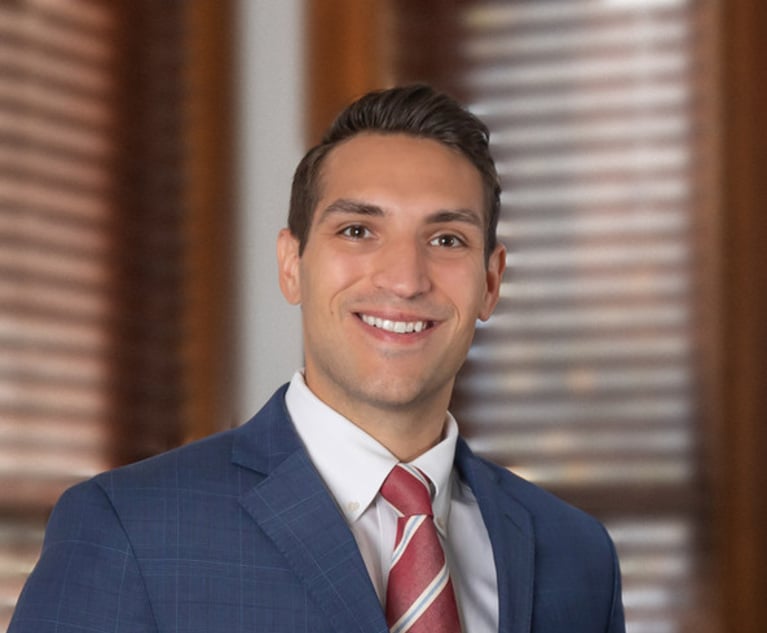As COVID-19 Shutters Offices, Small Law Firms Tackle Tech Issues With Remote Work
Attorneys at some of the state's smaller law firms discuss issues and technological concerns they face working remotely in the wake of COVID-19.
March 24, 2020 at 02:46 PM
4 minute read
 Lawyer working remotely. Photo: SFIO Cracho/Shutterstock.com
Lawyer working remotely. Photo: SFIO Cracho/Shutterstock.com
With more law firms closing their offices to mitigate the spread of COVID-19, some lawyers are running into the technology curve that comes with working from home.
Many firms have equipped their attorneys with laptops, scanners and printers, but Gary Phelan of Stratford-based Mitchell & Sheahan said working remotely still takes some time to get used to.
"I am old school when it relates to technology," Phelan said. "For example, I still write on legal pads. But over the past two weeks, I've been immersed in responding to media requests, seven in total. It's forced me to deal with the issue. Yesterday, I used Skype for the first time to do an interview."
Bridgeport criminal defense attorney Robert Berke said having meetings via teleconferencing and videoconferencing is "challenging for the type of work I do. In criminal defense, personal relationships are very important and it's not easy to have that personal relationship when you are videoconferencing."
Berke, whose Law Offices of Robert Berke has three attorneys and one paralegal, said "it's a challenge that I have yet to overcome. I've had six videoconferences with other lawyers, clients and even one witness since last week and people are skeptical. They are more comfortable in person as opposed to being on the phone."
Michael D'Amico, a partner with Watertown-based D'Amico & Pettinicchi, said Monday his staff—comprised of four attorneys and four support staff—is learning to work from home, but said it's not as convenient as being in the office.
"We are getting used to operating remotely when before we had everything at the office at our fingertips," D'Amico said. "Printing and scanning, for example, is difficult at home where they are slow and have limited capabilities. Using your cellphone with a scanning app is not the same as it is at the office."
D'Amico said his firm, which does personal injury work and medical malpractice litigation, has also found out that conducting depositions via videoconferencing has its own set of problems.
"It's challenging now more than ever because many of those we want to depose, including medical doctors and nurses, have more pressing issues now and other responsibilities" due to the coronavirus, D'Amico said.
At the Glastonbury-based Connecticut Trial Firm, co-owner and partner Andrew Garza said it's been easier for his firm because "our practice is entirely paperless. Every piece of mail in the office is scanned and shredded. The only thing we keep that is actual paper are the deposition transcripts for active litigation."
Garza said the firm's 10 employees, including four attorneys, all have a laptop, scanner and printer at home. "We use a program called Slack, which is how we do all of our internal communications. We've been able to maintain contact with everyone consistently despite what is happening in the outside world."
Garza said he has encouraged opposing counsel at defense firms to "try to resolve cases remotely, if possible. We can do remote depositions, remote mediations, and remote arbitrations. We need to find a way to move business ourselves. If everyone hits the pause button and waits for the courts to open, the courts will be crushed with cases when they do open."
Related stories
What Lawyers Need to Know for Next Week: Court Schedules, Coronavirus Updates
NOT FOR REPRINT
© 2025 ALM Global, LLC, All Rights Reserved. Request academic re-use from www.copyright.com. All other uses, submit a request to [email protected]. For more information visit Asset & Logo Licensing.
You Might Like
View All

Apple Disputes 'Efforts to Manufacture' Imaging Sensor Claims Against iPhone 15 Technology
Trending Stories
Who Got The Work
J. Brugh Lower of Gibbons has entered an appearance for industrial equipment supplier Devco Corporation in a pending trademark infringement lawsuit. The suit, accusing the defendant of selling knock-off Graco products, was filed Dec. 18 in New Jersey District Court by Rivkin Radler on behalf of Graco Inc. and Graco Minnesota. The case, assigned to U.S. District Judge Zahid N. Quraishi, is 3:24-cv-11294, Graco Inc. et al v. Devco Corporation.
Who Got The Work
Rebecca Maller-Stein and Kent A. Yalowitz of Arnold & Porter Kaye Scholer have entered their appearances for Hanaco Venture Capital and its executives, Lior Prosor and David Frankel, in a pending securities lawsuit. The action, filed on Dec. 24 in New York Southern District Court by Zell, Aron & Co. on behalf of Goldeneye Advisors, accuses the defendants of negligently and fraudulently managing the plaintiff's $1 million investment. The case, assigned to U.S. District Judge Vernon S. Broderick, is 1:24-cv-09918, Goldeneye Advisors, LLC v. Hanaco Venture Capital, Ltd. et al.
Who Got The Work
Attorneys from A&O Shearman has stepped in as defense counsel for Toronto-Dominion Bank and other defendants in a pending securities class action. The suit, filed Dec. 11 in New York Southern District Court by Bleichmar Fonti & Auld, accuses the defendants of concealing the bank's 'pervasive' deficiencies in regards to its compliance with the Bank Secrecy Act and the quality of its anti-money laundering controls. The case, assigned to U.S. District Judge Arun Subramanian, is 1:24-cv-09445, Gonzalez v. The Toronto-Dominion Bank et al.
Who Got The Work
Crown Castle International, a Pennsylvania company providing shared communications infrastructure, has turned to Luke D. Wolf of Gordon Rees Scully Mansukhani to fend off a pending breach-of-contract lawsuit. The court action, filed Nov. 25 in Michigan Eastern District Court by Hooper Hathaway PC on behalf of The Town Residences LLC, accuses Crown Castle of failing to transfer approximately $30,000 in utility payments from T-Mobile in breach of a roof-top lease and assignment agreement. The case, assigned to U.S. District Judge Susan K. Declercq, is 2:24-cv-13131, The Town Residences LLC v. T-Mobile US, Inc. et al.
Who Got The Work
Wilfred P. Coronato and Daniel M. Schwartz of McCarter & English have stepped in as defense counsel to Electrolux Home Products Inc. in a pending product liability lawsuit. The court action, filed Nov. 26 in New York Eastern District Court by Poulos Lopiccolo PC and Nagel Rice LLP on behalf of David Stern, alleges that the defendant's refrigerators’ drawers and shelving repeatedly break and fall apart within months after purchase. The case, assigned to U.S. District Judge Joan M. Azrack, is 2:24-cv-08204, Stern v. Electrolux Home Products, Inc.
Featured Firms
Law Offices of Gary Martin Hays & Associates, P.C.
(470) 294-1674
Law Offices of Mark E. Salomone
(857) 444-6468
Smith & Hassler
(713) 739-1250












